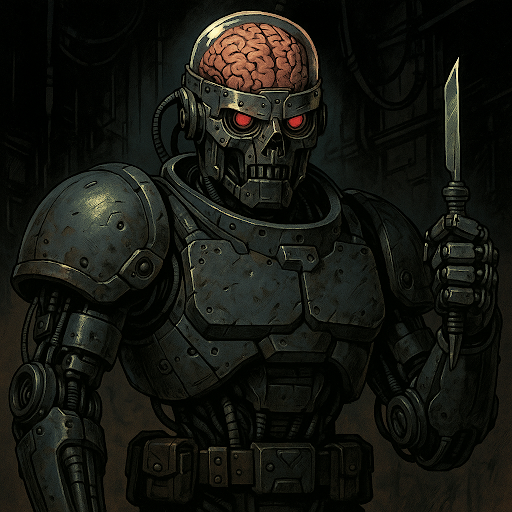Doktor Krieger Zandt
Background
Dr. Krieger Zandt was a brilliant young prodigy when the world fell into WWII. Trained under Axis-aligned scientific institutions, he quickly rose to prominence for his deep understanding of neurology, applied cybernetics, and biochemical weaponry.
However, Zandt's loyalty was never to Germany—it was to a vision of global order forged in the crucible of cold, brutal reason. He saw the Third Reich not as a final authority, but as a vehicle to test his Genius.
As the war ended and his peers were executed or were covertly absorbed into American and Russian scientific programs, Zandt vanished. Reports suggest he faked his death, fled with blueprints and preserved specimens, and helped found the paramilitary tech-syndicate known as S.W.A.R.M. There, over the next decades, he built horrors—cybernetic enforcers, AI-guided viral drones, and surgical nanoweapons.
To outlast his own mortality, Zandt began replacing his body—first organs, then bones, then his circulatory and neural architecture—until only his brain remained. Suspended in a nutrient tank and interfaced with a mechanized exoshell of his own design, Zandt has lived for over a century, reinventing himself as the cold, calculating architect of the future.
Personality
Cold. Detached. Clinical. Zandt is not without emotion—he simply values them as evolutionary relics. He sees humanity not as sacred but as flawed scaffolding for something greater. He believes the natural state of life is chaos, and the only escape is through structure, augmentation, and centralized control.
To Zandt, war is not a horror—it is a crucible. Pain is a purifying process, and survival is the only real morality. Unlike his infamous mentor Doctor Kill-Gore, who reveled in sadism, Zandt is void of cruelty for cruelty’s sake. He does not hate—but he does experiment. And he will dissect his enemies with the same cool indifference he brings to tuning a servo.
Despite his monstrous history, Zandt carries himself with precision, restraint, and a calculated sense of superiority. He is not driven by revenge or ideology, but by a singular goal: to create the next age of order from the bones of a fractured, obsolete world.
Dr. Krieger Zandt was a brilliant young prodigy when the world fell into WWII. Trained under Axis-aligned scientific institutions, he quickly rose to prominence for his deep understanding of neurology, applied cybernetics, and biochemical weaponry.
However, Zandt's loyalty was never to Germany—it was to a vision of global order forged in the crucible of cold, brutal reason. He saw the Third Reich not as a final authority, but as a vehicle to test his Genius.
As the war ended and his peers were executed or were covertly absorbed into American and Russian scientific programs, Zandt vanished. Reports suggest he faked his death, fled with blueprints and preserved specimens, and helped found the paramilitary tech-syndicate known as S.W.A.R.M. There, over the next decades, he built horrors—cybernetic enforcers, AI-guided viral drones, and surgical nanoweapons.
To outlast his own mortality, Zandt began replacing his body—first organs, then bones, then his circulatory and neural architecture—until only his brain remained. Suspended in a nutrient tank and interfaced with a mechanized exoshell of his own design, Zandt has lived for over a century, reinventing himself as the cold, calculating architect of the future.
Personality
Cold. Detached. Clinical. Zandt is not without emotion—he simply values them as evolutionary relics. He sees humanity not as sacred but as flawed scaffolding for something greater. He believes the natural state of life is chaos, and the only escape is through structure, augmentation, and centralized control.
To Zandt, war is not a horror—it is a crucible. Pain is a purifying process, and survival is the only real morality. Unlike his infamous mentor Doctor Kill-Gore, who reveled in sadism, Zandt is void of cruelty for cruelty’s sake. He does not hate—but he does experiment. And he will dissect his enemies with the same cool indifference he brings to tuning a servo.
Despite his monstrous history, Zandt carries himself with precision, restraint, and a calculated sense of superiority. He is not driven by revenge or ideology, but by a singular goal: to create the next age of order from the bones of a fractured, obsolete world.

Children




Comments